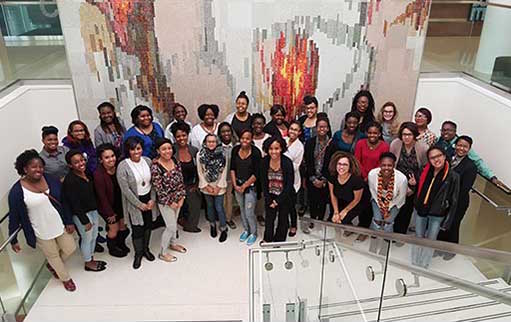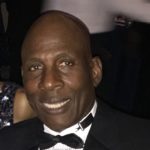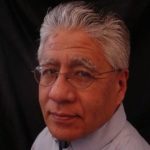
Colorado State University recently welcomed the largest and most diverse freshman class in its history. Almost a quarter of the new students are ethnically diverse, a figure that speaks to the University’s foundational principle of inclusive excellence. It also represents change and progress that occurred incrementally after campus protesters delivered a wake-up call to the CSU community in the late 1960s.
The Black/African American Cultural Center and El Centro are preparing to celebrate their 40th anniversary during Homecoming & Family Weekend, Oct. 6-8. To mark the milestone, we caught up with Manuel Ramos (’70) and Paul Chambers (’70), who led students in demanding civil rights for all people and increased diversity of the student body and faculty. While not achieving their goals immediately, they laid the foundation for the University’s current commitment to diversity and access.
Paul Chambers, charismatic leader
 Chambers had a distinguished career in business. A sociology major at CSU, he received an MA at CU-Boulder. He held marketing and management positions with major corporations, including IBM, Xerox, Miller Brewing Company, Chevrolet Motor Division, Audi of America, and Volkswagen of America. In 1998, he received a Distinguished Alumni Award from the College of Liberal Arts. After “retiring,” he started a business rehabbing houses in low-income areas and building houses in several states. Recently, he developed a passion for organic farming. He and wife Ann live in Pennsylvania.
Chambers had a distinguished career in business. A sociology major at CSU, he received an MA at CU-Boulder. He held marketing and management positions with major corporations, including IBM, Xerox, Miller Brewing Company, Chevrolet Motor Division, Audi of America, and Volkswagen of America. In 1998, he received a Distinguished Alumni Award from the College of Liberal Arts. After “retiring,” he started a business rehabbing houses in low-income areas and building houses in several states. Recently, he developed a passion for organic farming. He and wife Ann live in Pennsylvania.
Manuel Ramos, writer/righter
 Ramos spent his life making a difference and fomenting change. He majored in political science at CSU and, driven by a lifelong passion for reading and writing, also took courses in literature and creative writing. He then completed a law degree at CU-Boulder and with fellow CSU and law school alumnus David Vela (’70) opened a practice that included criminal defense, family law, and consumer cases. They also took on politically charged cases, represented picketers and protesters, and defended activists before federal grand juries.
Ramos spent his life making a difference and fomenting change. He majored in political science at CSU and, driven by a lifelong passion for reading and writing, also took courses in literature and creative writing. He then completed a law degree at CU-Boulder and with fellow CSU and law school alumnus David Vela (’70) opened a practice that included criminal defense, family law, and consumer cases. They also took on politically charged cases, represented picketers and protesters, and defended activists before federal grand juries.
B/AACC and El Centro 40th Anniversary Celebration
Paul Chambers and Manuel Ramos both invite you to join them at Homecoming and Family Weekend to celebrate the 40th anniversary of El Centro and Black/African American Cultural Center. A reception for alumni who worked with both organizations takes place Friday, Oct. 7, at 6 p.m. in Lory Student Center Ballrooms A and B.
And, in recognition of the anniversary, alums Vice President for Student Affairs Blanche Hughes, who worked with Black Student Services as it was known in the 1980s, and Polly Baca, the first Hispanic woman elected to the Colorado State Senate, will serve as Grand Marshals of the Homecoming Parade, which steps off from Oak and Howes streets at 4:30 p.m. on Friday.
Chambers invites alumni “to view what has happened to the CSU campus. I encourage you to be a role model and a resource for current students by sharing your career path with them and fellow alumni.”
Ramos says, “It is important to remember our history, a lot of which is being lost or forgotten. Alumni who were involved should acknowledge they played a role in historical events.” He notes “there was pain and sorrow in these events, but also joy.”
Ramos will also present a talk on “What is Chicano Noir?” on Oct. 13 at 6 p.m. in the LSC Ballroom D as part of National Latinx Heritage Month, sponsored by El Centro.
Ramos later joined Colorado Legal Services (CLS), providing representation in civil cases to individuals who could not afford an attorney. He served as Director of Advocacy and Deputy Director of Programs for CLS, seeing it grow to 15 offices throughout Colorado that employed 100 people, including 50 attorneys.
During the latter part of his legal career, Ramos returned to his childhood passion for writing. His first novel, The Ballad of Rocky Ruiz, won the Colorado Book Award for fiction and was a finalist for the Edgar Award from the Mystery Writers of America. Ramos then wrote a series of novels in this “Chicano noir” genre, winning more awards in the process. Manuel and wife Florence live in Denver, where he is working on his tenth novel.
Looking back on his days at CSU, Ramos says he is “very proud of what we all did. I feel lucky to have known these people. Those were heady times; the youth of this country believed we could create change.”
When discussing his role in the protests, Chambers is humble, citing the work of many students; student organizations such as Black Student Alliance, Mexican-American Committee for Equality, and ASCSU; and faculty members, particularly TR Young in sociology and James Hansen in history.
Things did not improve immediately. He explains that the administration’s response to the protests was “a lot of rhetoric and promises” as they claimed change would require additional funding. When he looks at Colorado State today, Chambers says, “All students, past and current, contributed to the progress that has been made.” He emphasizes the critical importance of ongoing efforts to increase diversity, support low-income students who are accepted to CSU, and ensure a welcoming, nurturing campus environment. “If you are never exposed to other colors of the rainbow, that is, other races, you will remain apprehensive and never realize the influence you may have on someone.”